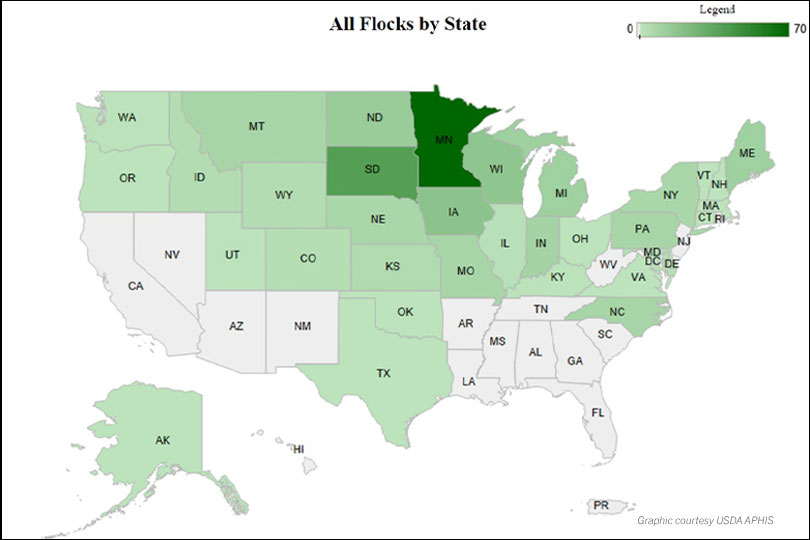By Jessica Domel
Multimedia Reporter
A third animal in Texas–a bald eagle in Bosque County–tested positive for the highly-contagious disease that has led to the deaths of thousands of domestic and wild birds across the nation.
The Texas Parks and Wildlife Department (TPWD) confirmed Tuesday the bald eagle tested positive for highly pathogenic avian influenza (HPAI) after a private landowner brought the bird to the attention of a wildlife biologist.
The eagle was showing symptoms of HPAI.
It is the second wild bird in the state to test positive.
“We have seen a fair amount of mortality occur in eagles, as well as black vultures,” Shaun Oldenburger, TPWD small game program director, said in an interview with Texas Farm Bureau Radio Network. “Anything that could basically prey on waterfowl, we’re seeing high susceptibility.”
Of the 1,112 wild birds in the United States that have tested positive for HPAI, 668 are bald eagles, 350 are geese and 81 are ducks.
“It does seem like upland game birds do have high susceptibility,” Oldenburger said. “There’s been a number of game farms in a few locations, New York being one, that have had to be depopulated.”
A pheasant from a commercial flock in Erath County was the first positive detection of HPAI in Texas this year.
Officials from the Texas Animal Health Commission (TAHC) told the Texas Farm Bureau Radio Network they believe the bird was infected by a wild bird carrying the disease.
That flock has since been depopulated, and the area is being monitored as a precaution.
Last week, a great horned owl in a rehabilitation facility Wichita County also tested positive for HPAI.
To date, HPAI has been found in 38 states nationwide, infecting waterfowl, wild birds and domestic poultry.
An estimated 37.55 million domestic birds have been affected in 172 commercial poultry flocks and 120 backyard flocks.
TAHC and TPWD are encouraging those who work with wild or domestic birds to enhance their biosecurity measures to mitigate the risk of HPAI introduction into their flock.
“Our best defense is for all poultry owners to join together in the effort to prevent disease by following strict biosecurity practices,” Dr. Andy Schwartz, TAHC executive director and state veterinarian, said.
Below are some tips from TAHC for poultry raisers:
- prevent contact with wild birds, especially wild waterfowl;
- restrict unauthorized people and vehicles;
- cover and enclose outdoor feeding areas, and covering stored feed;
- clean and disinfect any vehicle tires or equipment that has been on other farms or other locations where there is poultry or wild birds;
- wear clean clothing, boots and shoes when in contact with your flock; and
- isolate new birds.
Symptoms of HPAI include diarrhea, incoordination, lethargy, coughing and sudden death.
In domestic poultry, decreased water consumption, lack of appetite, respiratory distress, nasal discharge, decreased egg production and/or soft-shelled or misshapen eggs may also be symptoms of HPAI.
Not all infected animals will show outward symptoms of the disease.
HPAI is spread by direct contact with an infected bird, contaminated equipment, clothing and/or shoes.
“If you do have backyard chickens, make sure those birds have something over them so they don’t have, for instance, black vultures or something roosting above them that could defecate in there and spread disease,” Oldenburger said. “The influenza virus survives in a lot of biological material.”
If anyone notices these symptoms in their backyard or commercial poultry operation, they are encouraged to contact a veterinarian as soon as possible.
Those without a veterinarian are encouraged to contact TAHC at 1-800-550-8242.
TPWD is monitoring the wild bird population for signs of HPAI.
“Right now, Texas Parks and Wildlife biologists are responding to mortality events from susceptible species,” Oldenburger said. “We are getting those specimens and sending them off to the
National Wildlife Health Center or the Texas Veterinary and Medical Diagnostic Lab in College Station for testing.”
Texans who notice a group of dead, wild birds are encouraged to contact their local TPWD biologist.
The public can help reduce the spread of HPAI by limiting unnecessary contact with wild birds.
Wildlife rehabilitators are encouraged to remain cautious when intaking birds with clinical signs consistent with HPAI and should consider quarantining birds to limit potential HPAI spread.
According to the Centers for Disease Control and Prevention, the risk of transmission of HPAI from an infected bird to a human is low, but people should take basic precautions like wearing gloves and face masks and washing hands thoroughly if interactions with wild birds cannot be avoided.

